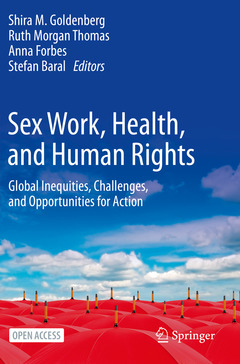Sex Work, Health, and Human Rights, 1st ed. 2021 Global Inequities, Challenges, and Opportunities for Action
Coordonnateurs : Goldenberg Shira M., Morgan Thomas Ruth, Forbes Anna, Baral Stefan

This open access book provides a comprehensive overview of the health inequities and human rights issues faced by sex workers globally across diverse contexts, and outlines evidence-based strategies and best practices.
Sex workers face severe health and social inequities, largely as the result of structural factors including punitive and criminalized legal environments, stigma, and social and economic exclusion and marginalization. Although previous work has largely emphasized an elevated burden and gaps in HIV and sexually transmitted infection (STI) services in sex work, less attention has been paid to the broader health and human rights concerns faced by sex workers. This contributed volume addresses this gap.
The chapters feature a variety of perspectives including academic, community, implementing partners, and government to synthesize research evidence as well as lessons learned from local-level experiences across different regions, and are organized under three parts:- Burden of health and human rights inequities faced by sex workers globally, including infectious diseases (e.g., HIV, STIs), violence, sexual and reproductive health, and drug use
- Structural determinants of health and human rights, including legislation, law enforcement, community engagement, intersectoral collaboration, stigma, barriers to health access, im/migration issues, and occupational safety and health
- Evidence-based services and best practices at various levels ranging from individual and community to policy-level interventions to identify best practices and avenues for future research and interventions
Sex Work, Health, and Human Rights is an essential resource for researchers, policy-makers, governments, implementing partners, international organizations and community-based organizations involved in research, policies, or programs related to sex work, public health, social justice, gender-based violence, women's health and harm reduction.
Shira Goldenberg, PhD (she/her), is the Director of Research Education at the Centre for Gender and Sexual Health Equity (CGSHE) and an Assistant Professor in the Faculty of Health Sciences at Simon Fraser University in British Columbia (BC), Canada. She is also adjunct faculty in the University of California, San Diego School of Medicine.
Dr. Goldenberg has conducted research on sexual health, violence, and human rights for im/migrants, sex workers, and young women since 2006. Her work has informed global policy initiatives and guidelines related to sex workers’, women’s and im/migrants’ health, including through informing international guidelines with the Joint United Nations Programme on HIV/AIDS (UNAIDS) and the International Association for Providers of AIDS Care.
Dr. Goldenberg’s work has demonstrated the serious health and social inequities faced by im/migrants and sex workers in Canada and internationally, with a particular focus on sexual health and HIV, labour rights, and access to health services. She is Principal Investigator (PI) of An Evaluation of Sex Workers’ Health Access (AESHA), an ongoing longitudinal, community-based cohort study focused on sexual health, human rights, and access to care among women sex workers in Vancouver, BC. Dr. Goldenberg also leads the Evaluating Inequities in Refugee and Immigrant Women’s Sexual and Reproductive Health Access (IRIS) Study with colleagues in BC. Her research employs qualitative, epidemiological, and community-based research approaches. Dr. Goldenberg is passionate about the role of community engagement and partnerships for ensuring ethical and effective approaches to research, programmes, and policy to advance the health and well-being of marginalized communities.
Ruth Morgan Thomas, BA (she/her) has been involved in sex work for 40 years: 8 years as a full-time sex worker, 2.5 years as an academic researcher looking at HIV-related risks in the sex indust
Date de parution : 02-2022
Ouvrage de 263 p.
15.5x23.5 cm
Date de parution : 04-2021
Ouvrage de 263 p.
15.5x23.5 cm
Thèmes de Sex Work, Health, and Human Rights :
Mots-clés :
sex work law reform; human rights violations and labor rights and protections; health disparities and health equity; epidemiology; marginalized populations; women's health; sexual health and reproductive health; HIV/AIDS; structural determinants; integrated interventions; harm reduction; stigma; sex worker criminalization and decriminalized settings; blood-borne and sexually transmitted infections (STIs); global burden of violence; global mental health; safety and health promotion; substance use; community mobilization and empowerment; migration and mobility; open access



